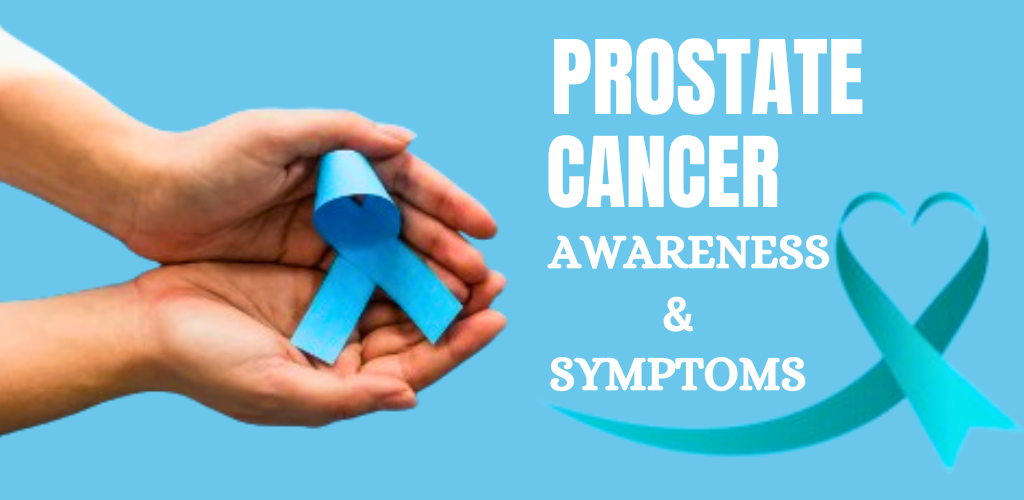
What you will do
Prostate cancer affects the prostate gland. The gland is located just below the bladder in males. It encircles the top part of the urethra, which drains urine from the bladder. This illustration depicts both a healthy prostate gland and a prostate gland with cancer. The prostate is a small walnut-shaped gland in males that produces seminal fluid, which nourishes and transports sperm.
Prostate cancers are one of the most commonplace forms of cancer. Many prostate cancers progress slowly and are limited to the prostate gland, where they may not cause significant harm. However, while some types of prostate cancer grow slowly and require little or no treatment, others are aggressive and spread rapidly.
Early detection of prostate cancer, while it is still confined to the prostate gland, gives the best chance of successful treatment.
What is the Main Cause of Prostate Cancer?
Genetic Predisposition:
-
Mutations and Inherited Genes: DNA alterations, both inherited and acquired, can have a significant impact. Some gene mutations, such as those in the BRCA1 and BRCA2 genes, increase the risk of developing breast and prostate cancer.
-
Family History: Having a close male relative with prostate cancer significantly increases your risk. This indicates a strong genetic component.
Environmental Influences:
-
Age: The danger of developing prostate cancer will increase with age, and a maximum of human beings are diagnosed by age 50. This approach that over the years, risk elements slowly accumulate
-
Diet: While the evidence is inconclusive, a few research propose an association between an excessive-fat weight-reduction plan, particularly beef and processed meals, and an expanded chance of prostate cancers and a weight loss plan wealthy in culmination, veggies, and excessive soy content might also provide some safety.
-
Hormones: Testosterone, the male sex hormone, plays an essential role in the boom and development of the prostate. Higher testosterone tiers can be related to the improved threat.
-
Chemical Exposure: Some studies have connected publicity to positive chemical compounds, together with Agent Orange, which was used at some point in the Vietnam War, to an extended risk of prostate most cancers
What Happens With Prostate Cancer?
Prostate cancer, like different kinds of cancer, is a result of mobile mutations. These minor DNA modifications cause the cells to develop faster and live longer than they would in any other case. These unusual cells accumulate and monopolize assets from normal cells, causing harm to surrounding tissue. Prostate cancer, the maximum common cancer in guys, can be a confusing and terrifying diagnosis. Understanding how this disorder progresses is vital for navigating treatment options and making knowledgeable fitness selections.
Understanding the Disease:
-
What is it? Prostate cancer is caused by the uncontrolled growth of cells within the prostate gland, which is a walnut-sized organ that produces seminal fluid.
-
How does it progress? Early-stage prostate cancer usually causes few symptoms and progresses slowly. However, if not treated, it can spread to nearby organs and bones, potentially causing death.
How long can an individual live with prostate cancer?
Prostate cancer, the most common among men, naturally raises concerns about how a diagnosis affects life expectancy. While you may not have a definitive answer, this guide will help you understand the complexities and set realistic expectations.
The Elusive Certainty:
-
Prognosis is not prophecy: There is no crystal ball for individual lifespans. Prostate cancer affects men differently, depending on a variety of factors.
-
Stages are important: Early-stage, slow-growing cancers frequently require minimal intervention and pose a low risk to survival. In contrast, advanced stages with metastases present a different picture.
-
Treatment's Impact: Effective treatment plans, such as surgery, radiation, and hormone therapy, significantly increase life expectancy. In contrast, failing to seek treatment can shorten one's life.
Numbers with Nuances:
-
Optimistic outlook: Statistics provide insight into possibilities. For example, more than 98% of men with early-stage prostate cancer live five years after diagnosis. This figure drops to 29% for advanced stages.
-
Remember that these are averages: Many people with advanced cancer live longer lives, whereas others with early-stage cancer face unexpected challenges.
-
Focus on the individual: Instead of focusing on numbers, prioritize understanding your specific case, discussing it with your doctor, and optimizing your treatment plan.
Living Beyond Statistics:
-
Proactive management: Early detection and treatment significantly increase life expectancy. Regular examinations and open communication with your doctor are essential.
-
Quality of life is important: While life expectancy is important, it is not the only factor to consider. Prioritise living a fulfilling life despite prostate cancer. Investigate support groups, practice healthy habits, and proactively address side effects.
-
Hope and Advancements: Remember, medical research thrives, constantly improving treatment options and increasing life expectancy. Stay current on new developments and embrace hope for the future.
Is Prostate Cancer Serious?
The prognosis of "prostate cancer" can shake a man's global, leaving him with one burning question: Is it severe?
Understanding the Spectrum:
Prostate cancer, the second most unusual cancer in men, is assessed into several types. Some instances are sluggish-growing and limited to the prostate, posing little chance and often requiring minimal intervention. Others, however, are competitive and can unfold quickly, posing large health dangers.
Factors Defining Seriousness:
Several factors determine the seriousness of prostate cancer:
-
Early-stage: cancers have a significantly better prognosis than advanced cancers.
-
Grade: The cancer's aggressiveness ("low-grade" vs. "high-grade") is important.
-
Overall health: Age, comorbidities, and general health all impact treatment options and outcomes.
Management, Hope:
Even when faced with a serious diagnosis, there is still hope. Advances in screening, diagnosis, and treatment provide significant benefits:
-
Early detection: Routine PSA trying out and digital rectal checks can capture cancer early while it's most treatable.
-
Treatment alternatives: Various powerful remedies are to be had, inclusive of surgical procedures, radiation, hormone remedies, and chemotherapy.
-
Support and assets: Numerous affected person advocacy agencies and intellectual health experts offer beneficial support throughout the adventure.
Is Prostate Cancer Painful?
Prostate cancer, the most common cancer in guys, is often associated with worry: is it painful? While the solution isn't clear, information on the opportunity of pain and other symptoms can assist guys navigate this important health difficulty.
Early Stages: A Silent Threat
In its early levels, prostate cancer is regularly well-known with no symptoms whatsoever. This "silent" nature emphasizes the significance of everyday screening with PSA exams and digital rectal exams, even in the absence of soreness.
When Pain Can Occur
Prostate cancer pain can manifest in different ways as the disease progresses:
-
Urinary Pain: If the tumor irritates the urethra, you could enjoy painful or burning urination (dysuria).
-
Pelvic Pain: A growing tumor can cause soreness or stress in the pelvis, rectum, or perineum via urgent surrounding systems.
-
Bone Pain: In advanced tiers, cancer spreads to the bones (metastasis), causing intense pain within the lower back, hips, thighs, and different areas.
Pain And Other Symptoms:
While ache is a capability symptom, it's important to keep in mind that other symptoms also can suggest prostate cancer:
-
Urinary problems: consist of common urination, trouble beginning or stopping urination, a vulnerable flow, and blood inside the urine.
-
Sexual problems: include erectile dysfunction, painful ejaculation, and a low libido.
-
General signs: encompass fatigue, weight loss, and bone fractures (in superior ranges).
Don't Ignore Any Changes:
Any new or worsening urinary, sexual, or general symptoms, regardless of whether they are painful or not, should be reported to a doctor right away. Early detection and intervention are critical for effective prostate cancer treatment.
How To Manage Pain?
-
For guys experiencing aches related to prostate cancer, various treatment alternatives can offer remedies:
-
Pain relievers: whether over the counter or prescribed, can assist in alleviating discomfort.
-
Radiation remedy: can decrease tumors and relieve aches.
-
Hormone therapy: This can slow most cancers and increase and decrease aches related to bone metastases.
-
Surgery: In some instances, getting rid of the prostate may also provide a pain remedy.
Can Prostate Cancer Be Cured?
Prostate cancer, a common concern for men, raises an important question: Is it curable? The answer, like the disease, is ambiguous. Let us look at the facts and offer hope, providing you with the knowledge you need to navigate this journey.
Cure Of Prostate Cancer
To understand curability, we must first define the term. In prostate cancer, a "cure" frequently refers to having no detectable signs of cancer after treatment and remaining cancer-free for an extended period, typically five years or more. However, even with successful treatment, there is a small risk of recurrence.
Early Detection & High Cure Rates:
What is the best news? Early-level prostate cancer has an outstanding remedy rate. Over ninety of guys continue to have most cancers if they are detected and handled before they spread beyond the prostate. This emphasizes the importance of everyday screening, in particular for men who've better hazard factors.
Treatment Options & Prognosis:
The sturdiness also depends on the treatment desire and the most cancers. Options like radical prostatectomy (surgical elimination) or radiation therapy have excessive achievement charges inside the early degrees. For extra superior instances, even as a definitive treatment is probably much less possible, remedies can manage the sickness, slowing its development and improving lifestyles.
Living With and Beyond Prostate Cancer:
Even after a successful remedy, living with prostate cancer necessitates vigilance. Regular compliance with appointments and tracking for symptoms of cancer are vital. However, a complete and lively lifestyle is entirely viable. With the right management and support, guys can triumph over obstacles and thrive for future years.
Visit Here: https://www.jasgurlifescience.com/oncology/abirabuzz-250-mg-tablet
https://www.jasgurlifescience.com/oncology/enzabuzz-40mg-capsules
https://www.jasgurlifescience.com/oncology/sorabuzz


Leave a reply
Your email address will not be published.